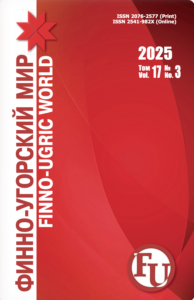DOI: 10.15507/2076-2577.011.2019.01.093-106
Valentina P. Minichkina,
Candidate Sc. {Economics}, Deputy Director for research,
Scientific center of socio-economic monitoring
(Saransk, Russia), minichkina@mail.ru
Elena S. Rus’kina,
Research Fellow, Editorial and Publishing Department,
Scientific center of socio-economic monitoring
(Saransk, Russia), redizd@mail.ru
The preservation and development of ethnic and cultural diversity of the peoples of Russia, the harmonization of national and interethnic relations can be achieved through the education of a person, a representative of a particular ethnic group (the bearer of its culture), as well as the development of a person, a citizen of one’s country. In other words, it can happen through the formation of ethnic and closely related civil identity of the individual within the framework of ethno-cultural education.
In the work the institutional approach is applied to the problem of ethno-cultural education, which reveals its possibilities from the perspective of relationships with the ethnic group, socio-cultural sphere and society. It allows to consider ethno-cultural education not only as a mechanism for the transfer of knowledge and training, but also as a cultural institution, which is an important means of preserving and developing the individual’s human and national identity.
Ethno-cultural education employs various methods and means of influence on the individual, aimed at preserving ethnic identity and national worldview. Epos becomes a powerful means of education and preservation of the national genetic code in the younger generation, and the formation of not only national but also universal values. The Mordovian epos “Mastorava” has received world popularity. Its literary version was created by a scholar and a poet A. M. Sharonov on the ancient Erzya and Moksha myths and epic songs. Meanwhile, it remains insufficiently studied, and its educational opportunities remain unrealized.
The authors conclude that it is expedient to be included in the process of ethnocultural education in a multinational region by the means of the study of epic works of the peoples inhabiting it, which will contribute to the formation of the ethnic identity of the individual.
Key words: identity; ethnic identity; civil identity; local identity; ethnic culture; education; ethno-cultural education; ethno-cultural upbringing; ethno-cultural component.
Acknowledgement: the research was carried out with the financial support of RFFR and the Government of the Republic of Mordovia in the framework of scientific project № 18-411-130015 pa.
For citation: Minichkina VP, Rus’kina ES. Epos as a factor of formation of ethnic identity of a personality (on the example of Republic of Mordovia). Finno-ugorskii mir = Finno-Ugric World. 2019; 1: 93–106. (In Russian)






















